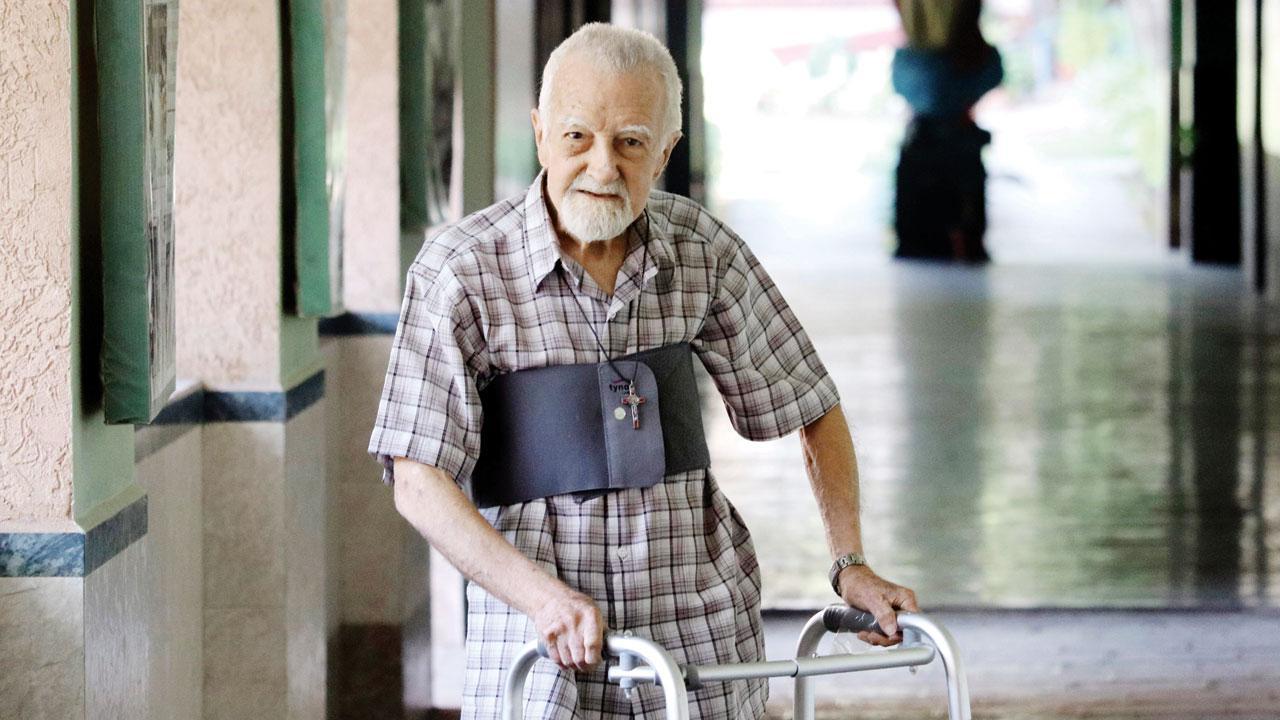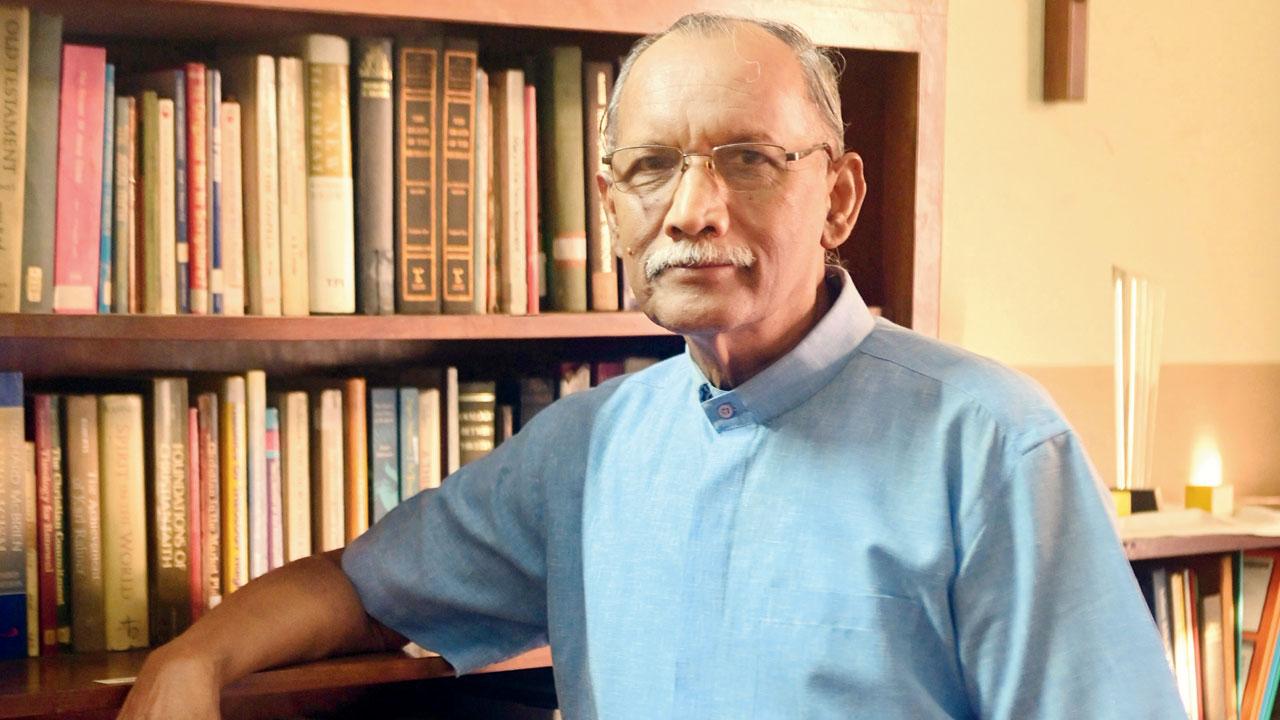As this year marks a century of Spanish missionary priests in Bombay, we salute the last of the doughty legion, who nurtured their faith in the country they know as home, sweet home

Fr Philip Terassa, 92, lives at the Vinalaya Retreat House in Andheri East. Like Fr Francis Juan from St Peter’s Bandra West, he too wishes he was granted an Indian citizenship. Pic/Anurag Ahire
A century ago, on November 26, 1921 to be precise, Archbishop Alban Goodier welcomed the “first three Spanish fathers and two brothers to India, calling their arrival in what was then known as Bombay one of God’s greatest blessings in these tragic days,” said Fr Myron Pereira. This year, 2021 is of spiritual significance as it marks 100 years to the advent of the Spanish priests in the city.
ADVERTISEMENT
“There are five or may be six Spanish priests left in the city, of those who planted and nurtured the faith along India’s west coast,” said Fr Pereira, Jesuit priest, from his residence at Campion School quarters in Colaba, giving historical context to the Spanish story. “After the German Jesuits were expelled from India post the first World War and British colonial authorities vetoed a plan to send American Jesuits to Bombay, the Jesuit Superior-General issued a command asking Spanish Jesuits, many who had worked in the Philippines for centuries, to re-locate to India. There was implicit obedience and submission to that order.”

Fr Myron Pereira says that after the German Jesuits were expelled from India post the first World War, the Jesuit Superior-General issued a command asking Spanish Jesuits, many who had worked in the Philippines for centuries, to re-locate to India. Pic/Bipin Kokate
Fr Pereira explained, “The Spaniards were hit by a culture shock at first, but overrode initial obstacles, through motivation and dedication. They did phenomenal humanitarian work and made huge contributions to the academic landscape. More than brick ’n’ mortar educational institutions of which there are many, attest to that stirring work, one has to only talk to legions of boys who will recall the deep impact these teachers have had on their lives with admiration and affection. Indian Jesuit priests, many recruited into the order by the Spaniards, who broke from tradition by taking Indian candidates into that Society, are carrying forward that legacy.”
Effortless integration
“Ours was not to question why,” said Fr Joseph Feliu, 93, about the orders to go to India. Fr Feliu resides at the St Pius X seminary in Goregaon. Unwell and currently bedridden, for Fr Feliu the idea of death recurs in the halting conversation with this reporter. “My heart is in India, I am more Indian than you,” he chuckled, with a decisiveness that is entirely believable. “I came here, not to do India a favour, but following a call. I have given my heart to this country, abundantly and I am happy, I am preparing to go to another life now. I attended a mass in Andheri recently, marking 100 years of Spanish priests here. That was the first time I went out since March last year,” he said. Then, as if suddenly recalling, he added, “Oh yes, I did go out [before that]. Sorry for not remembering. I went to take the COVID vaccine at a Bandra Hospital. I must rest now,” finished Fr Feliu, “Remember I am 93.”
The mass at Chakala, Andheri East, was held on October 17, celebrating the Spanish Jesuits’ arrival into Bombay, all of whom speak of their love for and integration into “Bharat” like some of them like to call it. The Zoroastrian community has a favourite “learnt-it-on-my-parents-knee” story about their assimilation into India. As immigrants fleeing persecution, the Zoroastrians landed in Gujarat. They had to convince a doubtful ruler to let them stay. They made their case as a silver bowl of milk was brought forward (symbolic of how the land was already full). The Zoroastrian elders added a pinch of sugar to the milk, and as it dissolved, it symbolised, they stated, how they would mingle effortlessly with the people and add sweetness to lives. Somewhat similarly, these Jesuit priests and their assimilation can be symbolised by a pinch of renowned Spanish saffron, that melts into milk, imbuing it with a golden hue.
Indian at heart
Fr Francis Juan, 90, from St Peter’s Bandra West, is originally from Valencia in Spain. “Earlier, I used to go home to meet my family, my siblings, nephews, nieces. It is a privilege for us, the Spaniards to be here; my Hindu brothers have showered me with love and appreciation, you are such wonderful people, all of you… I do wish the Indian government had given us citizenship, instead of making us renew our residential permits, periodically.”
That is the sentiment Fr Philip Terassa, 92, says “ditto” to. The priest has been living with Parkinson’s for a while, and is a resident at the Vinalaya Retreat House in Andheri East. “I love India, I do not want to go back to Valencia, though I do have fondness for Spain. I have to renew my residential permit regularly. I wish we had been granted citizenship. Maybe, that did not happen because of the conversion bogey that persists. As missionaries we never undertake any forced conversion, we talk about our faith and beliefs. Sometimes, because of wrong perceptions, we face prejudice.”
That, he says, is the present challenge. The challenges that he faced earlier, were of another kind. “When I came to India in 1948, as an 18-year-old, I experienced a shock. I did not know English, the food, customs, everything seemed alien.” The feisty priest remembered learning English in three months. “I lived amongst and loved the locals. I went to Gujarat, Pune, Mumbai… and was a student counsellor, too.” Fr Juan sums up his time and life in India, “God has been so good, I hope our life and work serves as some inspiration for others to follow.”
The famous five
The Society of Jesus (SJ) also known as the Jesuits is a religious order of the Catholic Church headquartered in Rome. It was founded by Ignatius of Loyola and six companions with the approval of Pope Paul III in 1540. Members of the Society of Jesus are expected to accept orders to go anywhere in the world, where they might be required to live in extreme conditions. Jesuits are thus sometimes referred to colloquially as “God’s soldiers”.
There are five from Spain in Mumbai today:
1. Fr Joseph Aran, lives in St Mary’s High School, Mazagaon
2. Fr Joseph Feliu, lives in Pius X Seminary, Goregaon East
3. Fr Francis Juan, lives in St Peter’s, Bandra
4. Fr Anthony Jurschik, lives in Infant Jesus Shrine, Nasik
5. Fr Philip Terassa, lives at Vinayalaya, Andheri East
 Subscribe today by clicking the link and stay updated with the latest news!" Click here!
Subscribe today by clicking the link and stay updated with the latest news!" Click here!







